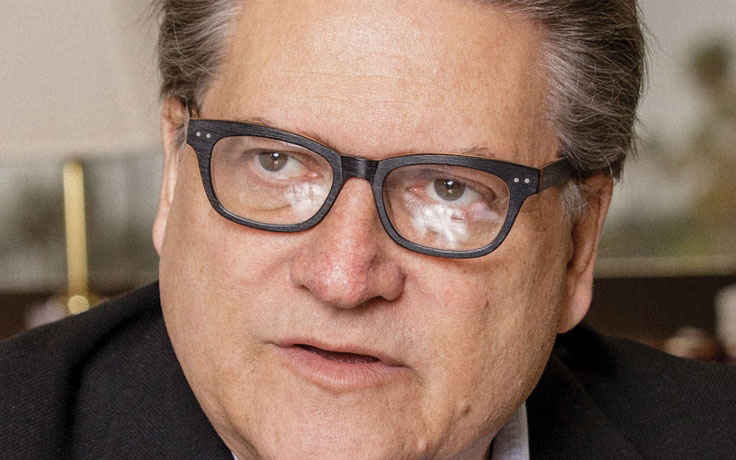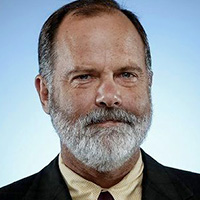SMART PUBLIC POLICY, said California State Sen. Robert Hertzberg, begins with a question: “What is the problem we are trying to solve?”
An afternoon with Hertzberg returns to that question again and again. It undergirds his work on initiative reform, redistricting reform, creation of a state rainy day fund (several funds, in fact) and bail reform. No weighty issue gets resolved, he argued, without first addressing the underlying problem.
Hertzberg, the Legislature’s most exuberant wonk, gets excited as he talks about these things. They’re not barnburners. No one is picketing or holding candlelight vigils for the fate of state Assembly districts. But this stuff lights him up.
In a recent interview, he reflected on his repeated attempts to tinker with the machinery of California government to improve representation, to downplay partisanship, to bolster the state against gyrations in the economy. Hertzberg acknowledges that the payoffs from this work rarely deliver any immediate help to any particular group. Collectively and over time, however, they are correcting fundamental problems in the way California works and bringing rationality and fairness to systems that have gone awry.
They are made for a wonk, and they have found their champion in Bob Hertzberg.
Hertzberg at work
Hertzberg’s San Fernando Valley office is in Van Nuys. It takes up much of the top floor of a strangely shaped, yellow building that houses state offices surrounding a covered courtyard. The courtyard once filled with rain, but Hertzberg persuaded Gov. Gray Davis to build a roof.
His suite is testament to his senses of history and humor. One nook houses a “Valley Hall of Fame” that honors, among others, John Elway and Marilyn Monroe. As he showed it off recently, an aide suggested that they make room for the Three Stooges, who were born in Brooklyn but made their fame in Hollywood. Hertzberg took note.
Offices inside the suite are named for California luminaries – William Mulholland, Upton Sinclair and the like. On this Friday afternoon, interns milled around a conference table, sipping soft drinks and plotting strategy. David Fleming, a lawyer and longtime Valley civic leader, has a corner office; he serves as a special adviser.
Hertzberg’s own space is chock-a-block with the ephemera of a life in politics, one that began in admiration of his father’s constitutional law practice. On one wall is a photograph of Supreme Court Justice Felix Frankfurter, who taught Hertz- berg’s father at Harvard. There is an editorial from the Los Angeles Times calling for his help with new ideas. There are stacks of law books and maps.
Hertzberg grew up in Los Angeles and later Palm Springs. His first political work was at the side of Mervyn Dymally, during Dymally’s campaign for lieutenant governor. Hertzberg drove him up and down California, visiting college campuses and all 58 counties. When Dymally won, he appointed Hertzberg to the state Youth Commission, and Hertzberg’s life in public office began.
Recognized early for his political acumen, Hertzberg helped launch dozens of careers, steering the campaigns of up-and-coming politi- cians. One of those he helped was a young labor organizer named Antonio Villaraigosa, who won an Assembly seat in 1994. Hertzberg followed two years later, and Villaraigosa, who quickly ascended to the Assembly speakership, cleared the way for Hertzberg to take that post as well.
As Speaker, Hertzberg tackled issues related to water and education, two of California’s most persistent and difficult challenges. Married with two sons, both now grown, he worked grueling hours, chairing late-night negotiations with abundant enthusiasm. “He all but explodes with plans,” a Los Angeles Times editorial said in 2005. “A high-velocity wonk, he loves BIG ideas, and will flesh out every one of them for you if you give him the time.
The big stuff
Termed out of the Assembly, Hertzberg left politics, but he did not go far, nor did he stay away long. After working in the private sector to develop green energy and serving on such policy groups as the blue-ribbon Think Long Committee, he won a seat in the state Senate in 2014. He is now the Senate majority leader — the first person to have held both that post and the speakership.
This has given Hertzberg plenty of opportunity to push policy, and he does so with relish and verve. Each time, he starts by asking what the problem is that needs solving.
His approach might sound obvious, but it is significant. Many politicians begin by asking not what problem needs solving but rather “Whose problem are we trying to solve?” That can lead down a path of service or toward satisfying special interests. Asking instead about the problem itself is more constructive. And once the problem is clearly framed, the challenge, Hertzberg said, is to identify a solution, then to build the constituencies necessary to win over legislators or voters. That last part is politics, but it comes after the policy goals are identified.
In other words, Hertzberg said: “What’s the problem you’re trying to solve? What does the research say about how to get there? And then how do you convince people?” Some examples:
INITIATIVE REFORM
Ever since the Progressive Era, California initiatives have provided voters with a check on government but also moved decision-making away from experts and into the hands of amateurs and special interests.
Confronting that problem more than a decade ago, Hertzberg and others consulted historians and political scientists and proposed a solution: Before appearing on the ballot, an initiative could come to the Legislature, where officials could take a crack at it. If the Legislature delivered an alternative that met the goals of the initiative’s sponsors, they could withdraw their initiative up to the last minute.
Supporters wooed the business community, good-government groups and community activists, urging them to back a measure that would protect the initiative process but curb some of its shortcomings and excesses.. Voters were persuaded and approved those changes in 2014. The Legislature has since headed off ballot initiatives by taking action on consumer protection and the minimum wage.
REDISTRICTING
Californians were understandably concerned that leaving the Legislature in charge of redistricting would produce voting districts that were unfair and influenced by political considerations of the legislative majority. Hertzberg supported creation of a bipartisan California commission with 14 members (four Republicans, four Democrats and the rest unaffiliated) that would take over the job. Supporters, including leaders of California Common Cause, fanned out across the state to meet with editorial boards and other opinion makers and build support for the package. Voters approved it in 2008.
THE RAINY DAY FUND
California’s budget relies heavily on income and sales taxes, which gyrate wildly with the economy. That’s not all bad – the income tax is progressive, making it politically popular – but this dependence made the state flush in good times, and then plunged it into the red when the economy turned down, decreasing revenue when services were needed.
One solution would have been tax reform, but that was more than governors or the Legislature wanted to take on. Instead, Hertzberg, along with Gov. Jerry Brown and others, supported increasing the percentage of the budget that the state salts away in preparation for downturns. California today has rainy day funds for overall spending and smaller ones for specific functions of government. The state is still vulnerable to the economy, but it is better equipped to weather shortfalls than at any point in recent history.
BAIL
Bail is intended for just one purpose, to insure that people charged with crimes show up in court. It does this fairly well, but at a cost: Those who cannot afford bail end up doing time in jail, in some cases only to be found not guilty. The result – and the problem – is that bail treats the poor more harshly than the wealthy, and may not be better than other methods of insuring court appearances. “We’ve built this corrupt architecture,” Hertzberg said.
His effort to reinvent that system has riled opponents, mainly bail bondsmen and those they employ. That’s hardly a remote constituency. Hertzberg’s office is only a few blocks from a bondsman. There are others throughout the state, near most jails. Hertzberg led the Legislature in approving a bill to eliminate cash bail, basing that in part on research that shows defendants are just as likely to make their appearances if the court provides timely reminders and holds out the threat of longer jail terms for those who miss dates. The bail industry has responded by funding a referendum that will appear on the ballot in November. Hertzberg is leading the campaign to defeat it.
From sausage to policy
Making policy is not always pretty. It requires a fusion of good ideas, compromises, coalition building and, all too often, money. Proposals that seem sound in theory sometimes fail once they are rolled out. When that happens, policymakers have to start over.
For some politicians, this is drudgery. There is not much conventional payback from ideas whose beneficiaries are diffuse, and there’s always the possibility of angering powerful interests — bail bondsmen, to name just one. But for Hertzberg, this is the fun of government, the reason to hold office at all.
“I have a son who is a classical music composer. He thinks in terms of all 116 instruments,” Hertzberg said. “I think the same way. I just do it in public policy.”
























